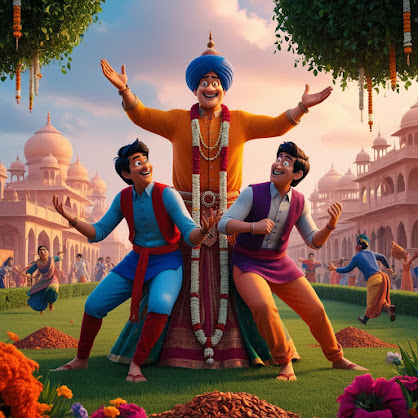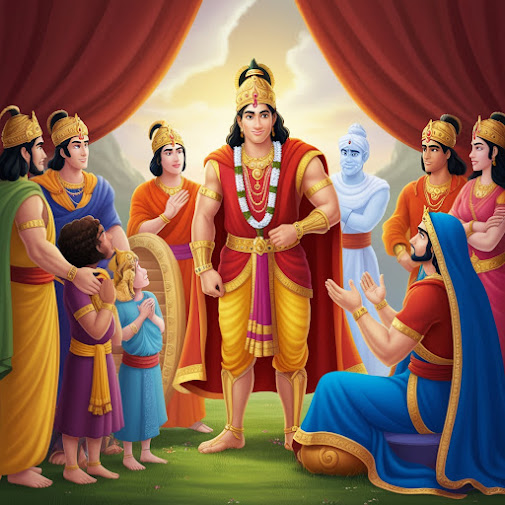The Garden King: A Story of Passion, Hard Work, and Imagination
Kew wasn’t just any boy. He was the son of Hathi, a respected figure in their village known for his wisdom and strength. While Hathi’s strength was physical, Kew had a different kind of power—the power of imagination and an unwavering passion for gardening. From a young age, Kew found joy and excitement in the world of plants and nature, a love that would shape his future.
.png)
A Special Gift: The Seed of a Dream
When Kew turned 5, his grandmother gave him a very unique gift. While other children received shiny gold coins and glittering jewels, Kew was given something far more valuable: a 30 by 15 feet garden plot. "This land is yours, Kew," Granny said with a smile. "A garden that will grow with your dreams!" The land had rich, clay soil—perfect for planting. Kew’s heart raced with excitement as he realized he had been given the opportunity to create something beautiful from the earth itself.
A Father’s Guidance and a Boy’s Determination
Kew’s father, Hathi, noticed his son’s deep connection to the garden and understood that this would be the place where Kew could grow—both literally and figuratively. Hathi built sturdy wooden gates to protect the plot, and with the family's support, Kew began his journey of transforming the empty space into something extraordinary.
At 13, Kew’s ambition to create the perfect garden intensified. He sketched designs, imagining bright flowers, vibrant vegetables, a sparkling pond, and even a small rock garden with metal yard art that would shimmer in the sunlight. His father, though proud of his son’s creativity, reminded him to focus on his studies. "You can’t grow a garden without first growing your knowledge," Hathi advised. But Kew’s passion was unstoppable. After much persistence, his father agreed to show him the basics of gardening.
Building the Dream
Kew eagerly set to work, mapping out every detail—from fragrant rose bushes to neat rows of tomatoes. He even chose plants that would bloom year-round, ensuring that his garden would always be alive with color. His physical training teacher, who shared Kew's love for plants, helped him learn about plant care, emphasizing the importance of patience and balance.
For nearly two years, Kew worked tirelessly, and the results were stunning. His garden transformed into a living masterpiece, featuring vibrant flowers, healthy vegetables, and a serene pond adorned with lilies. Kew even devised eco-friendly, organic methods to control pests, ensuring his garden remained healthy and thriving.
The Village’s Big Opportunity
One hot June afternoon, a District Officer visited the village for an inspection. The village had the chance to win a grand prize of 15 lakh, but only if it could impress him. The village chief led the officer through the streets, inspecting every corner. However, when they arrived at Kew’s garden, the chief dismissed it as "just a boy’s play." Undeterred, Kew decided to show the officer his "treasure land."
Despite the chief’s reluctance, the officer agreed to visit the garden. With his heart racing, Kew opened the gates and proudly declared, "Welcome to the Land of the Garden King!" He guided the officer through his vibrant garden, pointing out the rose bushes, vegetable plants, and peaceful pond surrounded by spring blooms. The officer was amazed by the beauty, harmony, and dedication of the garden.
The Village’s Victory
The following evening, at a grand dinner, the village chief announced that they had won the 15 lakh cash prize. The chief smiled at Kew, acknowledging that the garden had played a significant role in their victory. "This young boy’s garden was one of the key reasons for our success," he said. The room erupted in applause, and Kew’s father, Hathi, beamed with pride. Kew had not only transformed his land but had also helped transform the future of their village.
From that day forward, Kew was known as the Garden King—a symbol of hard work, creativity, and passion. His garden became a legend, showing the world that when you combine passion with dedication, anything is possible.
Moral of the Story: The Power of Passion and Hard Work
When you combine focus, hard work, patience, and passion, there is no limit to what you can achieve. Pursue your dreams, nurture your passions, and watch them grow.





.jpg)








.jpg)



%20(1).png)
.png)
%20(1).png)

